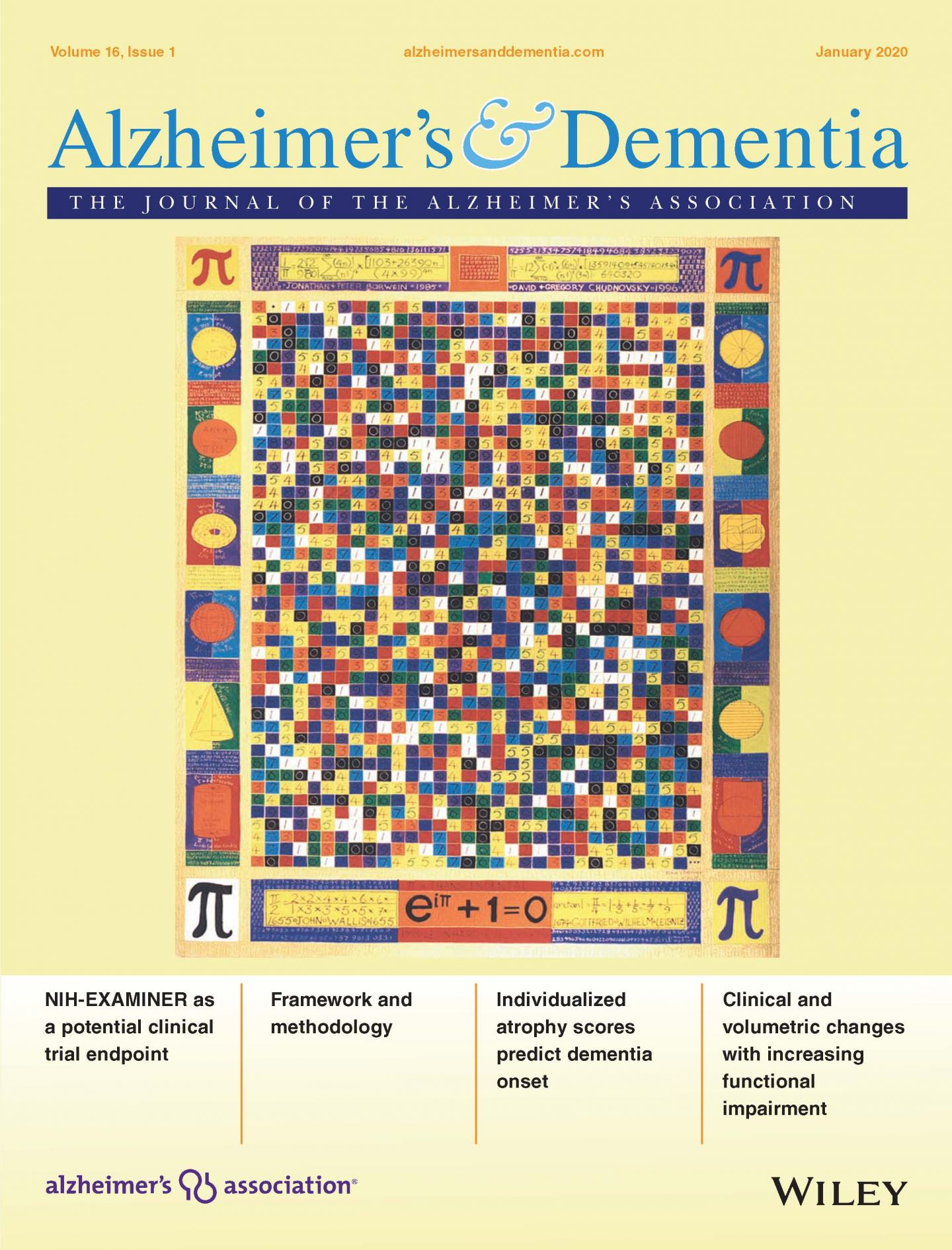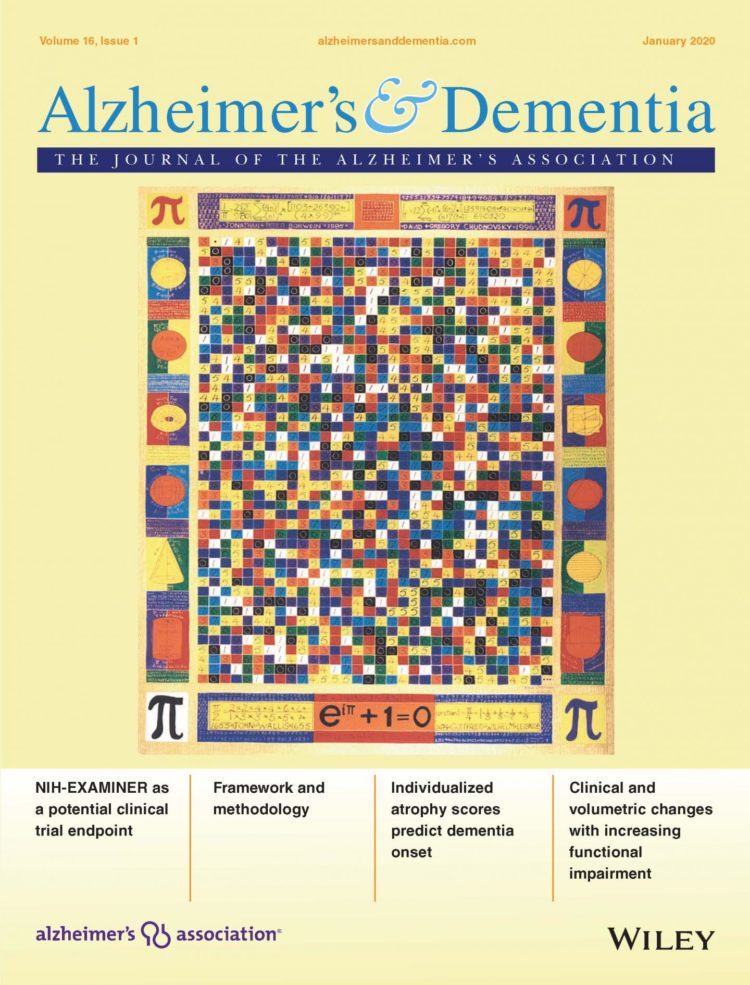Alzheimer’s & Dementia: The Journal of the Alzheimer’s Association January 2020 Journal Digest

Credit: Credit Alzheimer’s Association
CHICAGO, January 16, 2020 – A sleep medication already approved to treat insomnia in the general population may also be beneficial for individuals with Alzheimer’s, according to a new study published online today by Alzheimer’s & Dementia: The Journal of the Alzheimer’s Association.
The drug, suvorexant, was found to improve total sleep time for individuals with probable Alzheimer’s disease dementia and insomnia as compared to a placebo. Sleep disturbances are common among individuals with Alzheimer’s and other dementias. The researchers note that there is a potential for making cognitive declines worse when treating sleep problems in individuals with Alzheimer’s who may also be taking other medications for symptoms or behavioral problems related to their dementia. Surovexant did not worsen the underlying cognitive impairment in the study participants.
W. Joseph Herring, M.D., Ph.D., from Merck & Co., Inc. and colleagues conducted a four-week, randomized phase 3 clinical trial with 277 participants. The researchers found that total sleep time improved from baseline by 73 minutes for the suvorexant group and 45 minutes for the placebo group. The study authors note that the suvorexant-mediated sleep effects are maintained over the course of the night, unlike other currently available sleep drugs.
Link: “Polysomnographic assessment of suvorexant in patients with probable Alzheimer’s disease dementia and insomnia: A randomized trial”
The December print issue of Alzheimer’s & Dementia includes articles that add to the growing body of research suggesting risk and progression of Alzheimer’s varies by race. There are also differences found within the broader terms of Hispanic or Latino depending on a person’s family background. These studies illustrate the need for more diversity in research studies to better understand the racial and ethnic disparities in the risk and prevalence of Alzheimer’s. By understanding how race may alter Alzheimer’s risk and genetics, researchers may be able to create better diagnostic tools and treatment strategies that are effective in all communities. Key findings include:
- Researchers found nearly 10% of middle-age and older Latinos have mild cognitive impairment (MCI), a decline in memory and thinking skills. Prevalence ranges from 12.9% for individuals with Puerto Rican backgrounds to 8.0% among individuals with Cuban backgrounds.
- Older age, high cardiovascular disease risk and depression symptoms were significantly associated with MCI diagnosis.
The studies include:
Link: “Sex/gender differences in cognitive trajectories vary as a function of race/ethnicity”
Link: “Local ancestry at APOE modifies Alzheimer’s disease risk in Caribbean Hispanics”
Link: “Prevalence and correlates of mild cognitive impairments among diverse Hispanics/Latinos: Study of Latinos-Investigation of Neurocognitive Aging results”
Artificial intelligence may be useful to identify individuals at high risk for developing dementia by sorting through hospital discharge summaries, according to a study available online by Alzheimer’s & Dementia: The Journal of the Alzheimer’s Association.
Thomas H. McCoy, Jr., M.D., Massachusetts General Hospital, Boston created computer software to analyze the cognitive and behavioral symptoms documented in discharge notes in electronic health records of more than 500,000 individuals from two academic medical centers. McCoy and colleagues found that their machine learning system may help predict the risk of a healthy person developing dementia up to eight years in advance of a diagnosis.
According to the Alzheimer’s Association, early detection may identify individuals at high risk so they can get further clinical evaluation. An earlier and more accurate diagnosis enables access to approved drug treatments, and allows individuals to participate in planning for their future.
Link: “Stratifying risk for dementia onset using large-scale electronic health record data: a retrospective cohort study”
These articles and the rest of the January and December issues of Alzheimer’s & Dementia: The Journal of the Alzheimer’s Association are available online.
###
About the Alzheimer’s Association®
The Alzheimer’s Association is the leading voluntary health organization in Alzheimer’s care, support and research. Our mission is to eliminate Alzheimer’s disease through the advancement of research; to provide and enhance care and support for all affected; and to reduce the risk of dementia through the promotion of brain health. Our vision is a world without Alzheimer’s®. Visit http://www.
Media Contact
Jann Ingmire
[email protected]
312-335-5704
Original Source
https:/





